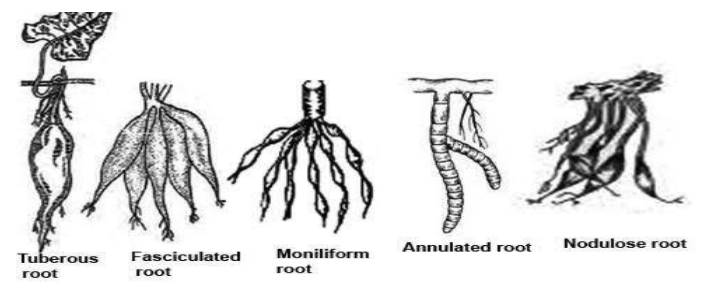
When the roots are alternatively swollen and constricted, presenting a beaded appearance, they are called as
A.Moniliform
B. Annulated
C. Tuberous
D. Nodulose
Answer
590.4k+ views
Hint: Adventitious roots are the roots that undergo modifications in response to external or internal stimuli. They undertake different forms in such a response.
These modifications take place for storage, additional support, nutrition, and respiration. Adventitious roots are of the following types- tuberous, fasciculated, moniliform, nodulose, and annulated.
Complete answer:

> Option (A)- Moniliform
Moniliform are adventitious roots that are swollen at regular intervals giving the appearance of beads of a necklace. Therefore, they are also known as beaded roots. For example, Baseila Rubra (India spinach), Momordica, and some grasses.
> Option (B) - annulated
Annulated roots are the type of adventitious roots that appear to be formed by the numerous discs placed one above the other. For example, Ipecac.
> Option (C)- Tuberous
Tuberous roots are a type of adventitious roots that are swollen. These are irregularly shaped tubers which arise singly from each node. For example Sweet potato.
> Option (D)- Nodulose
Nodulose roots are also adventitious roots. They are the slender roots that are swollen abruptly at the apex. For example Mango-ginger.
Hence, The correct answer is option (A).
Note: Adventitious roots are plant roots that are formed from any non-root tissue. They are produced both during normal development, for example- crown roots on cereals and nodal roots on strawberry, and also in response to stress conditions, like flooding, nutrient deprivation, and wounding.
These modifications take place for storage, additional support, nutrition, and respiration. Adventitious roots are of the following types- tuberous, fasciculated, moniliform, nodulose, and annulated.
Complete answer:

> Option (A)- Moniliform
Moniliform are adventitious roots that are swollen at regular intervals giving the appearance of beads of a necklace. Therefore, they are also known as beaded roots. For example, Baseila Rubra (India spinach), Momordica, and some grasses.
> Option (B) - annulated
Annulated roots are the type of adventitious roots that appear to be formed by the numerous discs placed one above the other. For example, Ipecac.
> Option (C)- Tuberous
Tuberous roots are a type of adventitious roots that are swollen. These are irregularly shaped tubers which arise singly from each node. For example Sweet potato.
> Option (D)- Nodulose
Nodulose roots are also adventitious roots. They are the slender roots that are swollen abruptly at the apex. For example Mango-ginger.
Hence, The correct answer is option (A).
Note: Adventitious roots are plant roots that are formed from any non-root tissue. They are produced both during normal development, for example- crown roots on cereals and nodal roots on strawberry, and also in response to stress conditions, like flooding, nutrient deprivation, and wounding.
Recently Updated Pages
Master Class 11 Computer Science: Engaging Questions & Answers for Success

Master Class 11 Business Studies: Engaging Questions & Answers for Success

Master Class 11 Economics: Engaging Questions & Answers for Success

Master Class 11 English: Engaging Questions & Answers for Success

Master Class 11 Maths: Engaging Questions & Answers for Success

Master Class 11 Biology: Engaging Questions & Answers for Success

Trending doubts
One Metric ton is equal to kg A 10000 B 1000 C 100 class 11 physics CBSE

There are 720 permutations of the digits 1 2 3 4 5 class 11 maths CBSE

Discuss the various forms of bacteria class 11 biology CBSE

Draw a diagram of a plant cell and label at least eight class 11 biology CBSE

State the laws of reflection of light

Explain zero factorial class 11 maths CBSE




